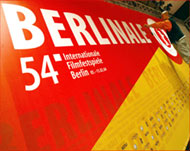Indian filmmakers tackle the taboo
Fed up with a film establishment they see as refusing to take risks, a group of Indian documentary makers are staging their own festival, tackling issues that rarely make it to the big screens of Bombay.

The event, called Vikalp, meaning “alternative”, was created in frustration at the film choices of the ongoing Mumbai International Film Festival, which is sponsored by the Indian government.
Organisers of the official festival for documentaries and animated films, a key date in the Bombay cinema calendar, sparked outrage in August when they proposed all entries be screened by the government censor board.
The festival backed off the proposal, but then rejected more than 30 films with the explanation that they had “uncomfortable” content.
Issues tackled include violence and sexuality.
Angry directors of some of the documentaries, that were rejected, decided to put together their own festival.
Among the works being screened at Vikalp is The Final Solution by Rakesh Sharma, an unflinching look at the ferocity of anti-Muslim riots in Gujarat state in 2002.
Graphic images
The Final Solution, which prompted walkouts in preview screenings in India, features graphic accounts of mass rapes of women by mobs during the bloodbath that left about 2000 people dead.
 |
|
The Final Solution is being |
The riots broke out after a Muslim mob torched a train, killing 59 Hindus. The torching was believed to be in retaliation for the rape of a Muslim girl, apparently by Hindus on the train.
Human rights groups say Gujarat’s government, led by India’s ruling Hindu nationalists, did little to stop vigilante attacks.
The Final Solution, which is being screened at the Berlin film festival, made its debut in India at the World Social Forum, the strategy meeting of 100,000 anti-globalisation activists held in Bombay from 16 to 21 January.
Alternatives
|
“We didn’t want to call for a complete boycott of the Mumbai International Film Festival as there is some good cinema being exhibited there, but we also want to offer people a choice” Anand Patwardhan, |
Appropriately enough, the alternative film festival is taking place in the organisational office of the World Social Forum in Bombay, just around the corner from the more mainstream event.
“We didn’t want to call for a complete boycott of the Mumbai International Film Festival as there is some good cinema being exhibited there, but we also want to offer people a choice,” said Anand Patwardhan, filmmaker and and organiser of Vikalp.
“This is the reason we found a venue practically across the street. People should be given the freedom to decide,” he said.
Gender and sexuality
Some of the 56 films at Vikalp dealt frankly with issues of gender and sexuality.
The alternative event, which closes on Monday, has won some converts. One group of university students from the southern Indian city of Hyderabad who had come for the International Film Festival, decided instead to spend their time at Vikalp.
|
“Vikalp will definitely continue next year – maybe in other cities and maybe even bigger” Divya Sharma, |
“This interested us more. We’ve also just brought out a magazine on censorship, so this is more relevant for us,” said Divya Sharma, a mass communication student.
Vikalp is being run on a miniscule budget, which organisers put at no more than 100,000 rupees, or $2200. Each filmmaker has been asked to contribute 1000 rupees ($22).
Those taking part in the shoestring operation believe the festival has a future in India, whose dominant film industry, Bollywood, is notorious for its hackneyed plots and big-budget advertising blitzes.
“We know it’s something that needs to happen again,” said Sharma, the maker of The Final Solution.
“Vikalp will definitely continue next year – maybe in other cities and maybe even bigger.”